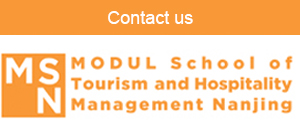
Research themes
The core areas of research that the faculty of the MODUL School of Tourism and Hospitality Nanjing will pursue are outlined below. It is expected that particularly topics related to the hospitality industry will be addressed with higher priority. Hence, managerial and entrepreneurial aspects and particularly human resource management and electronic distribution channel issues in the hospitality sector will be picked up preferentially. Course projects will be involved in collecting data and empirical evidence for Nanjing city and Jiangsu and neighboring provinces about supply, demand and managerial issues.
Through the already existing and fast growing industry network in Jiangsu province and Shanghai (emanating mainly from internship placements) many problems of the particular sector are exchanged and reflected between managers and faculty members. From this ongoing dialogue it is expected to be able to develop many challenging research projects of different scale.
Management and Entrepreneurship in the Hospitality Sector in China
Due to the rapid development of the entire tourism sector in Asia and particularly in China, a number of core functional areas should be given priority for research, improvement and stimulation for excellence:
Human Resource Management
If the current dominance of international employees on the middle and top management level of international hospitality companies shall change, quite a number of organizational and cultural changes will be necessary. How this transition can be planned and implemented will be an important challenge for sides, academia and industry.
The growth of liberal cross-border trade, the use of communications technology and the expansion of transnational companies are not likely to let up. Attracting global talent requires staying abreast of new strategies for finding and attracting talent. Companies are also faced with the need to develop the means to assess skills across divergent talent sources and then creating training programs to fill skills gaps after employees are hired. In addition, they need to understand how to manage and integrate multicultural employees.
Branding of International and National Companies
Brand identity, brand value, brand extensions, brand penetration, repositioning brands are only a few keywords linked to this area of research opportunities, which are deemed to be important in view of the opening and further internationalization of the tourism market in China.
E-Commerce
Information behavior in the 21st century with Web 2.0 and 3.0 will continue to change. Distribution channels have to be adapted to the modern needs of travelers from within Asia and beyond. The influences of new intermediaries as well as the impact of user-generated content are exciting fields of further developments that should be assisted by careful and reliable knowledge from academia.
Smart Governance in Smart Cities
Community involvement can be viewed as part of the inexorable ‘democratization’ of public life; as more countries move towards more fully market-based economic systems, citizens demand more involvement in all matters affecting their lives – including issues surrounding tourism development. Community Engagement in Tourism research at the Campus will address the following questions as social contribution, empowerment, globalization, democratization and sustainable development in tourism and hospitality.
In the early 21st century, societies and their governments around the world have been meeting unprecedented challenges, many of which surpass the capacities, capabilities, and reaches of their traditional institutions and their classical processes of governing. Among these challenges are the need for an accelerated transition of the global economy from its current fossil fuel basis to renewable energies, the so-called post-carbon era also known as the third industrial revolution, the containment and reduction of government spending and debt financing, the increasing rapidity of market changes, and the expanding lag of timely interventions via traditional lawmaking and government action. While upholding the proven principles of Western democracy, democratic self-governance in 21st century market economies apparently needs to develop new institutional formats and novel mechanisms for staying abreast with the systemic dynamics of a tightly interconnected global society.

2017 All rights reserved. 苏ICP备13023528号 Powered Bywww.300.cn Nanjing








